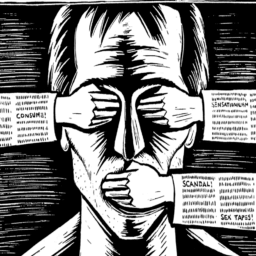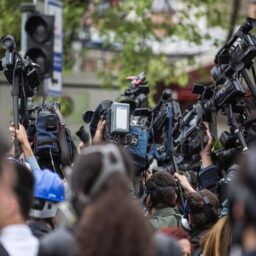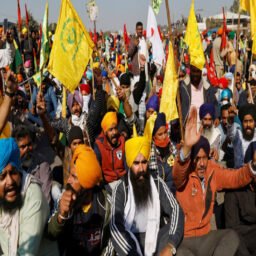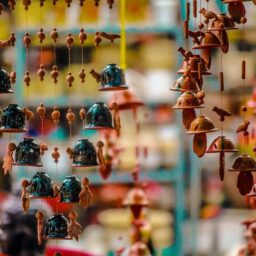
INTRODUCTION
The situation of covid-19 in INDIA getting worse day by day and now, INDIA is dealing with the second wave of the covid-19 pandemic. The Indian government has conducted elections during covid and blame game has started that who is responsible for this and many people are blaming the government for conducted elections during Covid, and some people are blaming traditions of religious festivals like conducting Kumbha Mela and for celebrating Holi like new normal but the number of people is blaming the government for the second wave of covid-19. Currently, INDIA has become the covid capital of the world.[i]
The Election commission of India issued new guidelines for conducting elections during the coronavirus pandemic with proper rules and regulation like wear a Face Mask during Election is made it mandatory by Election commission of India during any Election-related activities and restricted huge public gathering in the rally and long roadshow.
EC has also limited the number of people for door to door campaigning, not more than 5 in a group because in these circumstances, conducting election like normal conditions is extremely challenging due to coronavirus because this time is very crucial for us and elections activity require huge gathering and also public interaction at large and this is why they are not able to maintain social distancing and also avoid to wear a mask. Even after knowing all the rules which are mention by EC, the huge public gathering takes place and long roadshows have taken place in many states during the election campaign.[ii]
WHICH IS THE FIRST STATE WHO CONDUCTED ELECTION DURING COVID?
Bihar is the first state in India who has conducted Election during coronavirus pandemic in October 2020 at a large gathering and during casting vote, no one is maintaining social distancing and peoples was not wearing masks, and this is why the situation of Bihar is worst as compared to others state and death cases is increasing day by day and also covid-19 has resulted in deaths of many politicians. Many opposition parties demanded to postpone the election but EC has refused to postpone the election and said other countries are also conducting the election and EC has given the example of South Korea that this country is conducting a national election even the situation of this country is not normal and allowed elections in Bihar state also gave example of US Election which is also held in November 2020. There are also many election activities done by the ruling party like roadshows by Home minister Amit shah conducted at a large scale of gathering and no one is maintaining social distancing and also no one was wearing MASK, everything seems like normal.
ELECTIONS IN A DEMOCRACY
India is a democratic country and we choose our representative by giving our vote for them based on their work or also based on experience. In India election are conducted every five years and conducting free and fair elections are in the foundations of democracy. It is not just about casting vote for their favourite representative but also it provides people with the right to choose their party and cast vote to whom they think that he/she will work in favour of them. Many candidates enrol for this position but at the end of the election, the best candidate win which is chosen by you. But in a democracy, the election process is conducted in a proper process. It is very important to conduct an election lawfully and only deserving candidate will win because there is a chance of fraud while conducting the election process because this is a long process. That’s why to see the whole process of election, a committee is set to monitor the whole process.
The Election Commission of India is an independent legislative body charged with overseeing election processes at the central, state, and district levels in India. The body is in control of elections to the Lok Sabha, Rajya Sabha, regional Legislative Assemblies, state Legislative Councils, and the offices of the country’s President and Vice President. The Election Commission is governed by Article 324 of the Constitution, and the Representation of the People Act was passed later.[iii]
Under the Constitution, the commission has the authority to behave appropriately where passed regulations are unable to cope with a particular case in the operation of an election. The Election Commission, like the country’s higher judiciary, the Union Public Service Commission, and the Comptroller and Auditor General of India, is a legislative body that functions in both autonomy and independence. “The commission was created in 1950, with only a Chief Election Commissioner at the time. On the eve of the 1989 General Election, two new Commissioners were named to the commission for the first time on October 16, 1989 (on the eve of the 1989 General Election), but their appointment was brief, ending on January 1, 1990. On January 1, 1990, the Election Commissioner Amendment Act of 1989 was passed, making the commission a multi-member entity. Since then, a three-member committee has been in effect, with judgments taken by a plurality vote. According to the Chief Election Commissioner and other Election Commissioners (Conditions of Service) Rules, 1992, the Chief Election Commissioner and two Election Commissioners, who are normally retired IAS officers, receive wages and pensions on par with those of Judges of the Supreme Court of India. The secretariat of the commission is based in New Delhi.” Deputy Election Commissioners, who are usually IAS officers, support the Election Commissioners. Directors General, Principal Secretaries, Secretaries and Under Secretaries also support them.
“The Chief Electoral Officer of the State, who is an IAS officer with the rank of Principal Secretary, assists the Election Commission at the state level. District Magistrates (in their role as District Election Officers), Electoral Registration Officers, and Returning Officers conduct election work at the district and electorate levels.” Elections, Part XV of the Constitution, is a code in and of itself, laying the framework for the passage of appropriate laws and the establishment of appropriate machinery for the conduct of elections.[iv]
CONCLUSION
As we know India is a democratic country and also it is the largest democracy in the world and due to this, it has the largest election exercise. But conducting elections in the middle of the pandemic by keeping politics activity as their priority and keeping aside health and safety is not acceptable as a leader of our country. by knowing all the situations of India still they ignored and conducted all exercise like before this outbreak and due to this new strain of coronavirus has come which is like a slap on their faces. Also, you cannot just blame the government for this situation, I think we all are responsible for this second wave of coronavirus by avoiding the reality of the Covid scenario.
Author(s) Name: Nisha Bharti (UPES, Dehradun)
[i] https://www.bbc.com/news/world-asia-56875805
[ii] https://www.hindustantimes.com/india-news/ec-issues-guidelines-for-conduct-of-general-elections-during-covid-19-full-details/story-mGY55YpjNjVTZ3cJlb79qI.html
[iii] https://indiankanoon.org/doc/950881/
[iv] https://www.mea.gov.in/Images/pdf1/Part15.pdf















